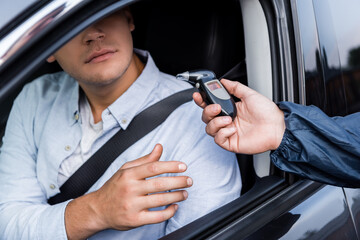Law enforcement officers in Iowa and across the country use breathalyzers to determine whether drivers are operating their vehicles under the influence of alcohol. These tests are often administered during an OWI (Operating While Intoxicated) investigation. If you are facing drunk driving charges and the case against you hinges on the results of a breathalyzer, you are likely wondering whether you can challenge the test results. When facing criminal charges, it is crucial that you understand your legal rights and options. Reach out to a Dallas County OWI lawyer today for skilled representation and legal advice.
What is a Breathalyzer?
A breathalyzer is a handheld device that measures the alcohol content in a person’s breath. It then provides a reading estimating the individual’s BAC (blood alcohol concentration), which indicates the driver’s intoxication levels. The legal limit is 0.08; if the results are higher, the driver can be arrested and charged with driving under the influence.
Can I Challenge a Breathalyzer Test in Iowa?
While breathalyzers can provide powerful evidence of drunk driving, there are many situations that allow you to challenge the results. Consider the following.
- Device not calibrated: Like any other electronic measuring device, breathalyzers must be calibrated regularly in order to accurately measure an individual’s BAC. If you can prove that the device had not been calibrated recently enough when you were tested, it could be a valid reason to challenge the evidence.
- Officer not trained: Police officers must be trained and certified to administer breathalyzer tests. They must know how to use the device and follow proper procedures, like monitoring the driver for a certain amount of time before administering the test. If the officer’s certification lapsed or they did not follow the right process, the results could be deemed unreliable.
- External factors: Certain medical conditions or external factors can affect the accuracy of a breathalyzer test. There is a chance that the test yielded a false positive due to gastrointestinal conditions, mouthwash, burping or vomiting, or certain medications. If you can present evidence that some condition or other factor may have affected the results, it could be grounds to challenge the test.
- Violation of rights: Even if the test was administered properly and provided an accurate reading, any evidence, including a breathalyzer, can be thrown out if it was collected illegally. If the traffic stop or breath test were conducted without probable cause or in violation of your rights, the results could be deemed inadmissible in court.
Any of the above or more reasons could be effective in fighting your drunk driving charges. If you have been arrested, it is imperative that you work with a skilled criminal defense attorney who can evaluate your situation, determine the best defensive options, and build a strong case.
For more information and to obtain experienced legal counsel, contact a lawyer at Iowa Defenders, PLLC today.

